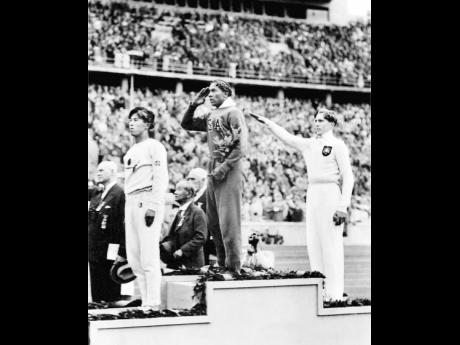Politics and sport
A country is governed by politics, and there is a great deal of political involvement when it comes to sports and the arts.
The history of the Olympic Games reflects many of the political issues that have dominated the 20th century. Sports have been used as a political weapon to prove that one political system is better than another (capitalism vs communism and fascism vs democracy, etc.) or one country's dominance over another (Russia vs the United States, etc).
They have also been linked to human-rights issues and to national politics (South African apartheid/Russian invasion of Afghanistan, etc).
These issues become interlinked with the prestige that international events bring to the host nation.
In Berlin, 1936, Hitler used the games for propaganda purposes. He believed that his race was superior to other races. His racist views were upset by Jessie Owens and other black United States (US) athletes, who he refused to congratulate even though they were winners of many events.
Melbourne withdrawals
In Melbourne, 1956, Spain and Holland withdrew because the Union of Soviet Socialist Republics (USSR) had invaded Hungary, China withdrew because Taiwan was allowed to compete, and Egypt and Lebanon did not compete because Britain and Israel invaded Egypt as a result of the Suez Canal Crisis.
In Tokyo, 1964, South Africa was not allowed to compete because of their apartheid policy. In Mexico City, 1968, many nations threatened to boycott the games if South Africa was allowed to compete. As a result, the South African invitation was withdrawn by the International Olympic Committee (IOC). In that same year, black USA athletes wore black berets and raised their fist clenched above their heads on the victory platform in a black power salute, to protest racial issues in the US.
In Munich, 1972, Rhodesia (now Zimbabwe) was not allowed to compete when most African nations threatened to withdraw, as Rhodesia had a white minority government. In that same year, Palestinian terrorists kidnapped and killed an Israeli athlete. Competitors from Syria, Egypt and Kuwait left after five terrorists were killed.
In Montreal, 1976, Taiwan was banned because the IOC only recognised China, and black African nations withdrew because some New Zealand rugby players had toured South Africa.
US-led boycott
In Moscow, 1980, many western nations, led by the US, boycotted the games because of the Soviet Union's invasion of Afghanistan in 1979. Only about half of the expected competitors took part, however, British athletes competed despite government pressure not to do so.
In Los Angeles, 1984, the USSR, many eastern European countries and Cuba withdrew from the games in retaliation for the 1980 boycott of the Moscow Games because of expressed concern over the safety of their competitors.
The Olympics is not the only sporting event to provide examples of political interference. Table tennis tournaments were organised to normalise relations between the US and China, and the phrase 'ping pong' diplomacy was born.
Policies and funding - role of government
Most countries will have a minister in charge of sport and it is their job to put forward the policies and determine where the money goes.
The government is committed to sports, especially the sporting needs of young people.
CARICOM established the Council of Human and Social Development because it sport as an important part of community life. The group looked at various aspects of physical education and sports, including policy guidelines for schools, drugs, drug testing in sports, and ways to improve the roles and impact of sports at all levels.
Sport is increasingly being linked to social policy, for example:
- Health
- Crime prevention
- Social cohesion
- Community relationship/
building
Government raises money from taxes and other sources (sponsors, lotteries, etc.), then decide how and where it will be allocated and spent.
In most countries, funding is provided for school and community sports facilities, starting grassroots sports programmes, training coaches, supporting elite athletes and sending teams to international events.
For the national governing bodies to receive money from the government, the following are expected:
- Plans must be in line with what the government wants.
- Targets must be in detail.
- Targets must be achieved.
Next Week: Gender equity, violence and drugs in sports.

